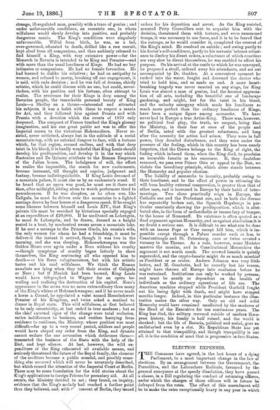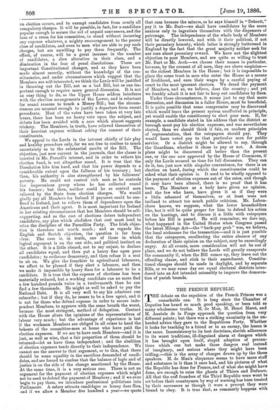ELECTION EXPENSES.
THE Commons have agreed, in the last hours of a dying Parliament, to a most important change in the law of elections. By an arrangement between the Government, the Parnellites, and the Labonchere Radicals, favoured by the general annoyance at the speedy dissolution, they have passed a clause, in a Bill regulating the conduct of returning °Tigers, under which the charges of those officers will in future be defrayed from the rates. The effect of this amendment will be to make the rates exceptionally heavy in any year in which
an election occurs, and to exempt candidates from nearly all compulsory charges. It will be possible, in fact, for a candidate popular enough to secure the aid of unpaid canvassers, and the loan of a room for his committee, to stand without incurring any expense whatever, a mighty encouragement to the poorer class of candidates, and even to men who are able to pay such charges, but are unwilling to pay them frequently. The effect, of course, will be a great increase in the number of candidates, a slow alteration in their class, and a diminution in the fear of penal dissolutions. These are important Constitutional changes, and as they have been made almost secretly, without the knowledge of the con- stituencies, and under circumstances which suggest that the Members are self-interested, we think the Lords will be justified in throwing out the Bill, not as a bad Bill, but as one im- portant enough to require more general discussion. It is not an easy thing to do, as the Upper House seldom interferes with the election arrangements of the Lower, and is reluctant for sound reasons to touch a Money Bill ; but the circum- stances are unusual enough to justify a departure from recent precedents. Most of the votes have been taken at very late hours, there has been no heavy vote upon the subject, and debate has been avoided with a care which almost suggests trickery. The Members, in truth, have relieved themselves of their heaviest expense without asking the consent of their constituents.
We appeal to the Lords in the interest chiefly of fair play and healthy procedure only, for we are free to confess to much uncertainty as to the substantial merits of the Bill. The objection, just now current in the journals, that the clause is inserted in Mr. Parnell's interest, and in order to relieve his election fund, is not altogether sound. It is true that the Dissolution hits him hard, and that his power depends to a considerable extent upon the fullness of his treasury ; but then, his authority is also strengthened by his followers' poverty. He could not control rich men as he controls the impecunious group whom he has collected round his banner ; but then, neither could he so control men relieved by the State from election charges. We would
gladly pay all Members for Ireland if payment could be con- fined to Ireland, just to relieve them of dependence upon the
Americans and their agent. It is most important for Ireland in her existing circumstances that her Members should be self- supporting, and as the cost of elections deters independent candidates, any plan which abolishes that cost must tend to relax the discipline of the Parnellite Party. The Irish objec- tion is therefore not worth much ; and as regards the English and Scotch objection, the question is far from clear. The case is, in truth, one of those in which logical argument is on the one side, and political instinct on
the other. It is a little absurd, not to say unjust, to declare all candidates equal, and then put a heavy fine upon poor candidates ; to enthrone democracy, and then refuse it a seat to sit on. We give the franchise to agricultural labourers, we affect to be pleased if they elect a labourer, and then we make it impossible by heavy fines for a labourer to be a candidate. It is true that the expense of elections has been materially reduced, but a working candidate can no more find a few hundred pounds twice in a twelvemonth than he can find a few thousands. He might as well be asked to pay the National Debt. It is all very well to say his admirers can subscribe ; but if they do, he ceases to be a free agent, and it is not for those who defend expense in order to secure inde- pendent Members, to approve with the same breath the worst, because the most stringent, method of delegation. Contact with the House alters the opinions of the representatives of labour very much ; but the advantage of experience is lost if the workmen Members are obliged in all crises to heed the behests of the committee-men at home who have paid the election expenses. If we are to have such Members—and it is just, as well as wise, that a fair proportion of them should be returned—let us have them independent ; and the abolition of election expenses tends directly to their independence. We cannot see the answer to that argument, or to this, that there should be some equality in the sacrifices demanded of candi- dates, and are forced to confess that the balance of logic and of justice is on the side of the change sanctioned by the House. At the same time, it is a very serious one. There is not an argument for the payment of election expenses which might not be used to defend the payment of Members ; and if we once begin to pay them, we introduce professional politicians into Parliament. A salary attracts candidates as honey does flies, and if we allow a Member five hundred a year—we quote
that sum because the miners, as he says himself in "Debrett," pay it to Mr. Burt—we shall have candidates by the score anxious only to ingratiate themselves with the dispensers of patronage. The independence of the whole body of Members will be directly lowered, and with it their political, if not their pecuniary honesty, which latter is strongly buttressed in England by the fact that the great majority neither seek for nor care about pecuniary reward. We have not the slightest objection to poor Members, and are quite as willing to trust Mr. Burt or Mr. Arch—we choose their names in particular, because, by the consent of all men, they are above suspicion— as the richest Members in the House ; but it is impossible to place the same trust in men who enter the House as a means of livelihood, and earn their wages by a careful paying of court to the most ignorant electors. We dread the payment of Members, and so, we believe, does the country ; and yet we frankly admit it is not fair to keep out candidates by fines. Under these circumstances, it seems just to say that more discussion, and discussion in a fuller House, must be beneficial. It is quite possible that some compromise may be discovered which would leave the present system unaffected in principle, yet would enable the constituency to elect poor men. If, for example, a candidate stated in his address that the district or borough must pay his election expenses, and was nevertheless elected, then we should think it fair, on modern principles of representation, that the ratepayers should pay. They would have voted pay to that particular man for public service. Cr a district might be allowed to say, through the Guardians, whether it chose to pay or not. A dozen plans might be discovered all better than the present one, or the one now approved by the House of Commons, if only the Lords secured us time for full discussion. They can do it, too, just now with singular convenience, for there is an election on hand, during which the constituencies could be asked what their opinion is. It used to be wholly opposed to the payment of election expenses out of the rates, and though it may have been altered, there is no proof that it has been. The Members as a body have given no opinion, and the few who have, have given it as if they were a little ashamed of themselves, or at least were not inclined to attract too much public criticism. Mr. Labou- chere knows, we suppose, what the lower householders like, but it will be quite proper for him to defend his action on the hustings, and to discuss it a little with ratepayers before his Bill is passed. He will remember, we dare say, what happened in the United States when Congress passed the latest Mileage Act—the "back-pay grab" was, we believe, the local nickname for the transaction—and it is just possible that the ratepayers, recollecting the entire absence of any declaration of their opinion on the subject, may be exceedingly angry. At all events, more consideration will not be out of place, and we do not believe the Lords will greatly exasperate the community if, when the Bill comes up, they leave out the offending clause, and stick to their amendment. Constitu- tional changes should be made in daylight, and by separate Bills, or we may some day see equal electoral districts intro- duced into an Act intended ostensibly to improve the demarca- tion of parish bounds.





































 Previous page
Previous page